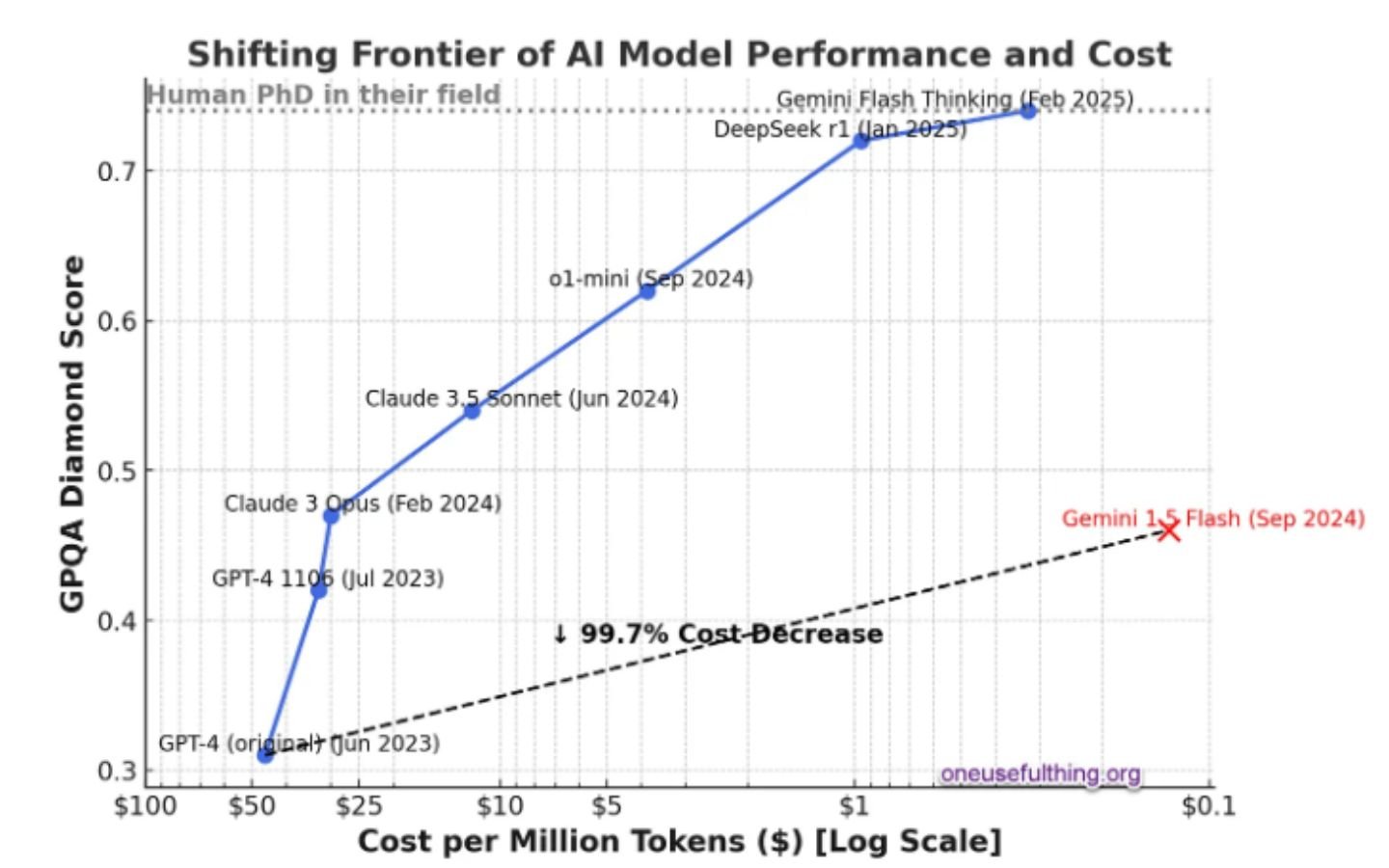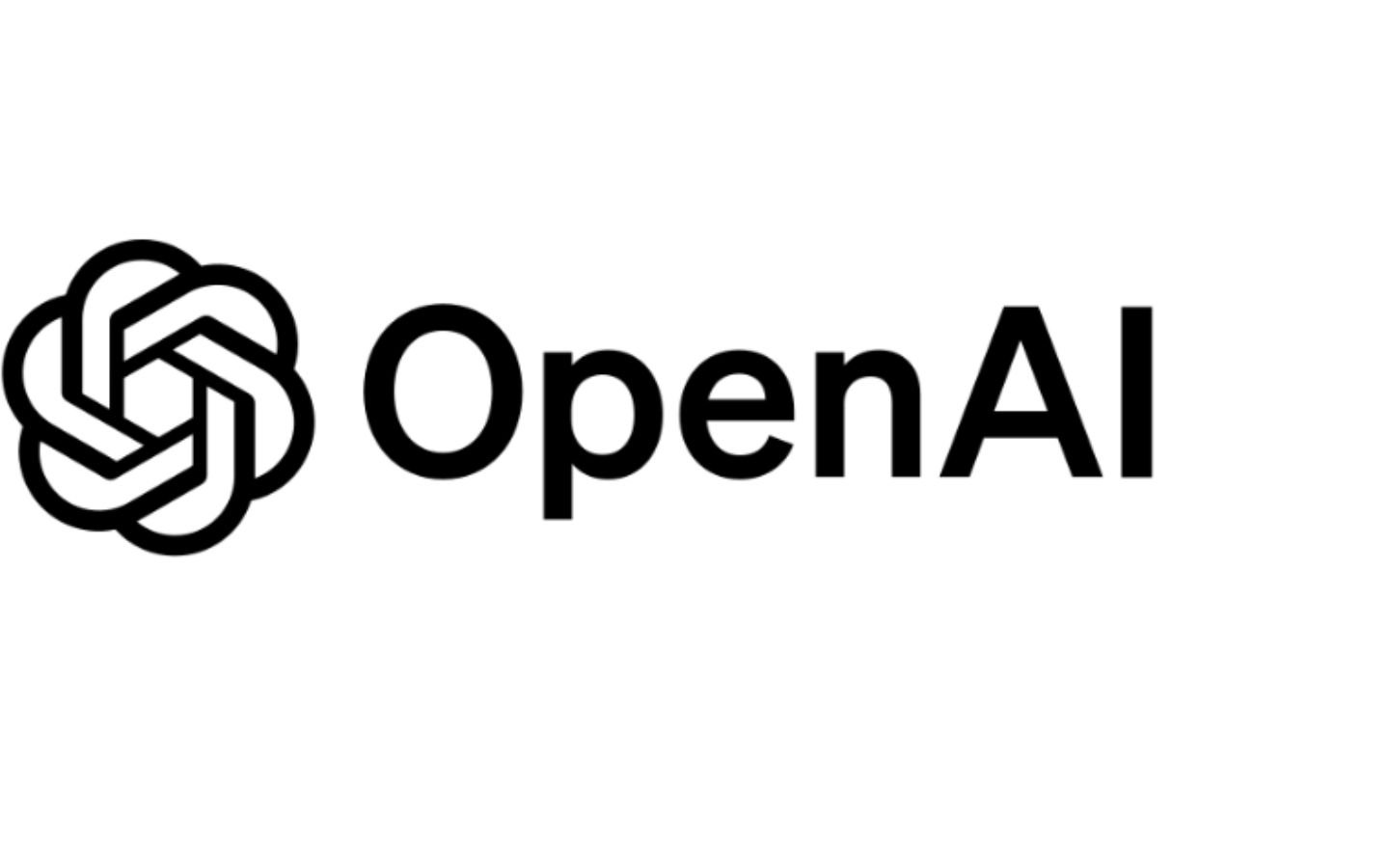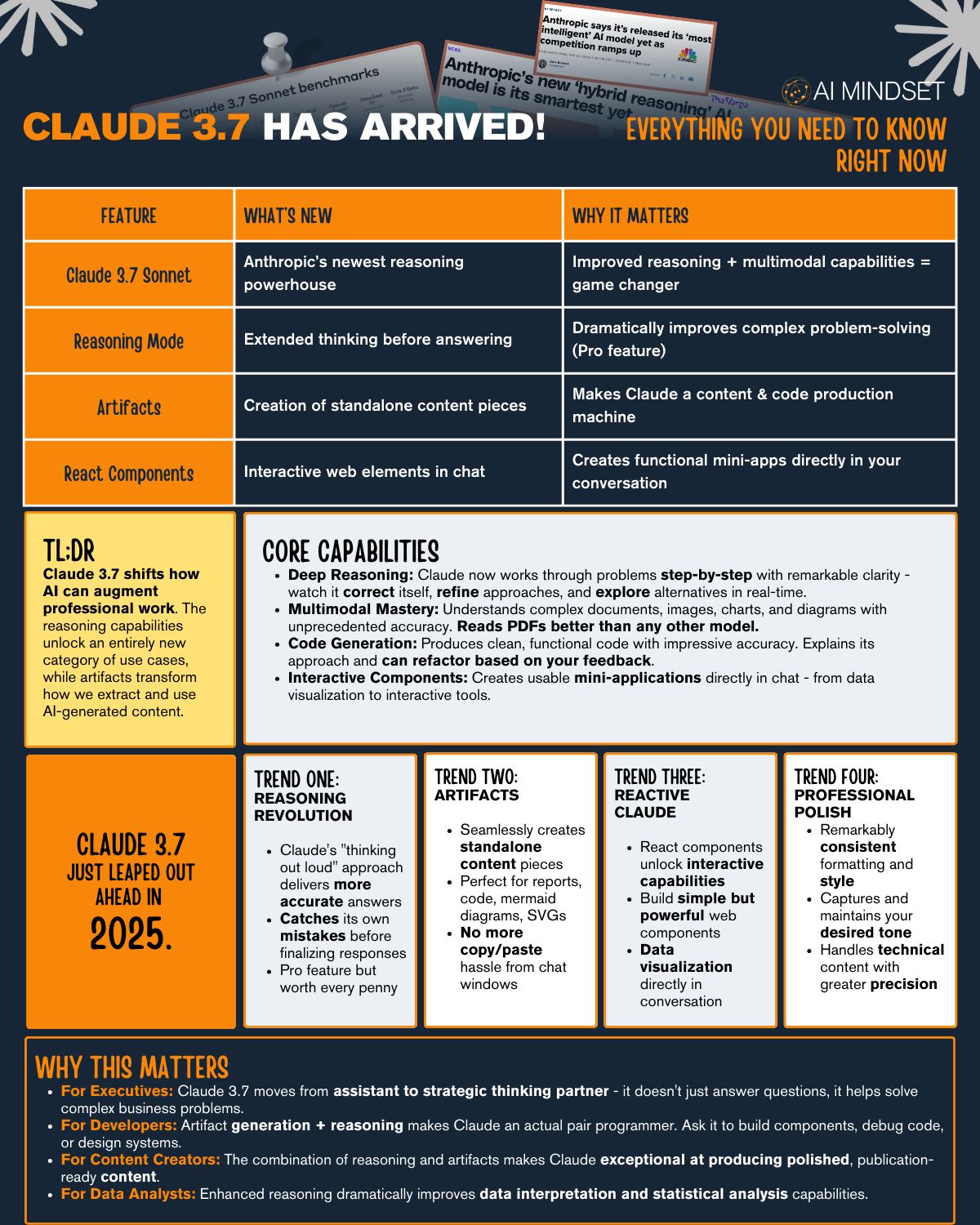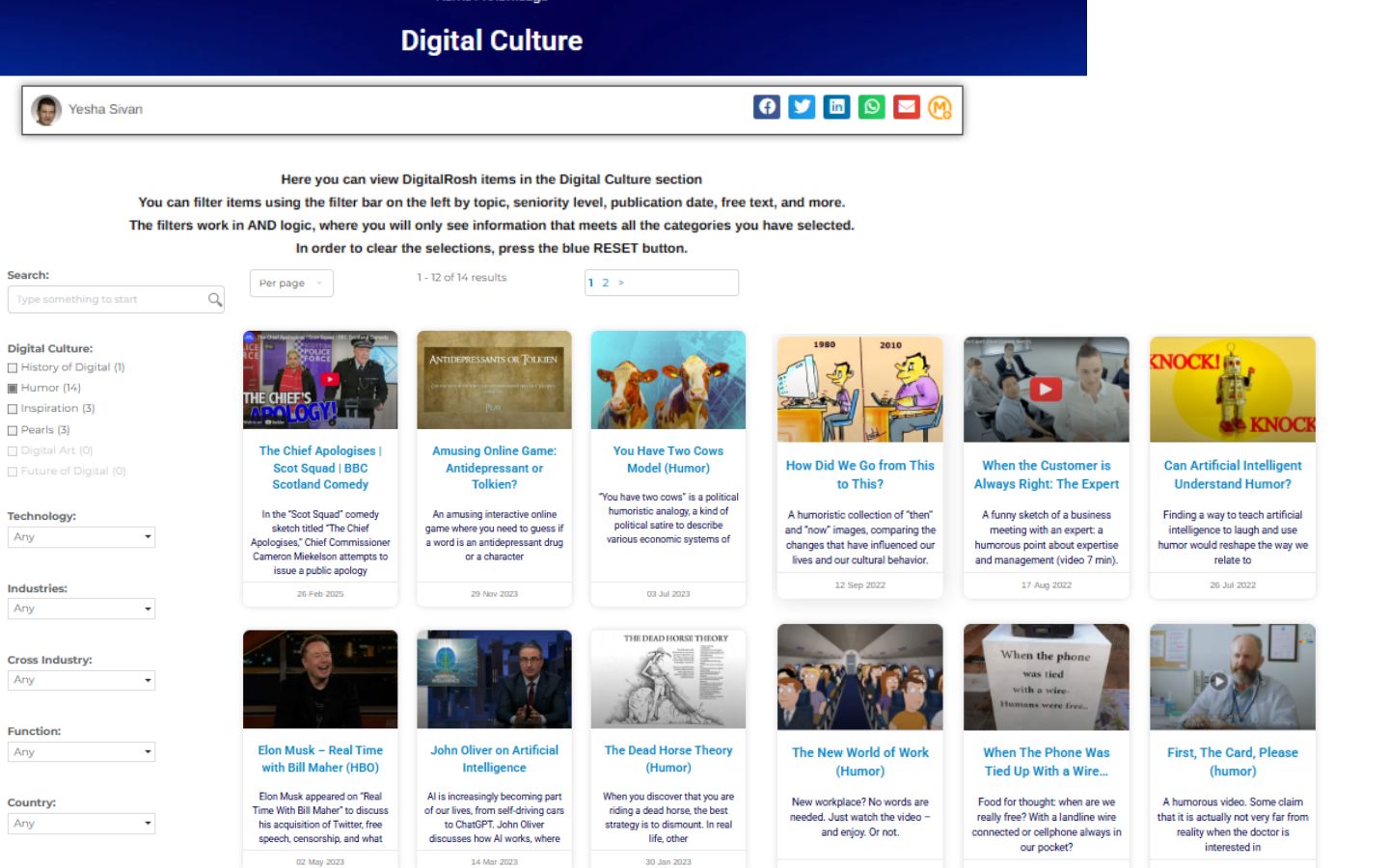Greetings AI Thinkers,
This week’s Leadership CONNECT:
- Spark of the week: The AI Cost Drop — What Leaders Must Know💰(Source: Yesha on Human Thinking)
- Review: OpenAI Deep Research Is Better and Globally Available (Source: OpenAI)
- Review: Anthropic Releases Claude 3.7, and Folks Are Going Nuts. (Source: Conor Grennan)
- AI Case: Khanmigo, by Khan Academy — Prep, Tackle Homework Challenges, and Get Personalized Tutoring. (Source: Khanmigo Site )
- Our Collection: Humor (Source: DigitalRosh)
Happy Thinking,
Dr. Yesha Sivan and the MindLi Team
P.S. Comments, ideas, feedback? Send me an e-mail.
1. Spark of the Week: The AI Cost Drop — What Leaders Must Know💰(Source: Yesha on Human Thinking [2])
Background
Ethan Mollic, a leading voice in AI, recently (24-Feb-2025) shared key insights in his post “A new generation of AIs: Claude 3.7 and Grok 3.” [1] Among other things, it includes the above quality/cost visualization.
On the Y-axis: Quality, as defined by the Graduate-Level Google-Proof Q&A test (GPQA) is a series of very hard multiple-choice problems designed to test advanced knowledge. PhDs with access to the internet get 34% right on this test outside their specialty and 81% inside their specialty (marked approximately as “Human PhD in their field”).
On the X-axis, the cost per million tokens is the cost of using the model (Gemini Flash Thinking Costs are estimated). The data is based on Mollic’s research, but Epoch and Artificial Analysis were good sources, and Latent Space offers a more comprehensive graph of costs across many models.
“This graph shows how quickly this trend has advanced, mapping the capability of AI on the y-axis and the logarithmically decreasing costs on the x-axis.”
Specifically, when GPT-4 came out, it was around $50 per million tokens (each token is roughly a word). Now, it costs around 12 cents per million tokens to use Gemini 1.5 Flash, an even more capable model than the original GPT-4.
A Few Things to Note:
- This is a map from June of 2023, the release of GPT-4, a relatively short time.
- The cost Y axis is logarithmic—meaning prices drop a lot — 99.7% by one measure.
- On the other hand, we need many more tokens these days. For example, research engines generate answers with 10,000 tokens and more.
- Soon (as is already the case with the new Anthropic 3.7), the engine will decide if the user wants a short and quick answer or more profound research (this feature was planned for GPT-5.0, and Anthropic has already released it). In the API, you can state if you want deeper thinking — meaning more tokens).
- If you are technical, Special technologies for users or corporate, like RAG, may not be needed, as you can simply send the entire content to be processed.
Top Five Lessons for Leaders
- AI is Becoming Ubiquitous: As costs drop, AI will be integrated into nearly every business function, making strategic adoption crucial.
- Competitive Edge Depends on Execution: As AI becomes more accessible, organizations’ success in implementing and optimizing AI solutions will determine their differentiation.
- The Cost of AI is No Longer a Barrier: The decreasing price of AI means more companies, including startups, can leverage advanced AI capabilities without massive investments.
- Increased AI Usage Requires Smarter Governance: More AI-generated content and automation demand strong oversight, ethical considerations, and security protocols.
- Adaptability is Key. Organizations continuously updating their AI strategies and workflows will reap the most value from AI advancements.
My Tips for You
- Are you paying the minimum $20 per OpenAi (ChatGPT), Anthropic (Claude), etc.? If not, please do so—it will help you use it and teach you a lot.
- Much like mobile or cloud, which used to cost hundreds of dollars and now cost much less, major tech players like OpenAI, Google, and Anthropic will likely dominate AI as a service in a few years. On top of that, you will get specific services for various business functions, and then you will have your particular use—this is where you will shine and need to compete.
[1] See Mollic Post.
[2] See all the Sparks in Yesha on Human Thinking Collection.
2. Review: OpenAI Deep Research Is Better and Globally Available (Source: OpenAI)
Deep research is now rolling out to all ChatGPT Plus, Team, Edu, and Enterprise users!
Since the initial launch, we’ve made some improvements to deep research:
✅ Embedded images with citations in the output
✅ Better at understanding and referencing uploaded files
Give it a prompt, and ChatGPT will find, analyze & synthesize hundreds of online sources to create a comprehensive report in tens of minutes vs what would take a human many hours.
3. Review: Anthropic Releases Claude 3.7, and Folks Are Going Nuts. (Source: Conor Grennan)
Anthropic has launched Claude 3.7 Sonnet, a hybrid reasoning AI that blends quick responses with deep analytical thinking—perfect for complex tasks like coding and math. An extended thinking mode is available with a $20/month Pro subscription.
You can access it via the Claude app, API, Amazon Bedrock, and Google Vertex AI. Additionally, they’ve introduced Claude Code, an advanced AI coding assistant. Claude 3.7 Sonnet sets a new standard for AI reasoning and problem-solving with its versatility and intelligence.
4. AI Case: Khanmigo, by Khan Academy — Prep, Tackle Homework Challenges, and Get Personalized Tutoring. (Source: Khanmigo Site )
Khanmigo, built by the nonprofit Khan Academy, is a top-rated AI for education. Save time on prep, tackle homework challenges, and get personalized tutoring.
Key Points (Mindli Spark AI on 26-Feb-2025)
- Khanmigo is an AI-powered tutoring and teaching assistant developed by Khan Academy, designed to enhance educational experiences for both students and teachers.
- It provides personalized tutoring, homework assistance, and critical thinking challenges, encouraging learners to discover answers independently rather than simply providing solutions.
- The platform is integrated with Khan Academy’s extensive content library, covering a wide range of subjects from math to humanities and coding.
- Khanmigo is rated highly, receiving a 4-star rating from Common Sense Media, distinguishing it from other AI tools like ChatGPT.
- Access to Khanmigo requires a subscription, and it is available for learners under 18 with parental consent or through school district partnerships.
5. Our Collection: Humor (Source: DigitalRosh)
Everyone smiles sometimes—when was the last time you did? Can’t recall or want to smile again?
Explore our Digital Culture Humor. And rediscover your smile 😊
About MindLi CONNECT Newsletter
Aimed at AI Thinkers, MindLi CONNECT newsletter is your news source and inspiration.
Enjoy!
MindLi – The Links You Need
General:
- Website — MindLi.com — All the details you want and need.
- LinkedIn — MindLi 🌍 GLOBAL Group — Once a week or so, main formal updates. ⬅️ Start here for regular updates.
- WhatsApp — MindLi Updates — If you need it, the same global updates will be sent to your phone for easier consumption. This is similar to the above Global group — once a week or so.
- Contact us – We’re here to answer questions, receive comments, ideas, and feedback.
Focused:
- LinkedIn — MindLi 🧠 AI Group — More technical updates on AI, AGI, and Human thinking. ⬅️ Your AI ANTI-FOMO remedy — Almost Daily.
- LinkedIn — MindLi 👩⚕️HEALTHCARE Group — Specifically for our favorite domain — healthcare, digital healthcare, and AI for healthcare — Weekly.
- LinkedIn — MindLi 🛠️ FOW – Future of Work Group — thinking about current and future work? This is the place for you — Weekly.
- LinkedIn — MindLi 🕶️ JVWR – Virtual Worlds Group — About virtual worlds, 3D3C, JVWR (Journal of Virtual World Research), and the good old Metaverse — Monthly.
- LinkedIn — MindLi Ⓜ️ Tribe Group — Our internal group for beta testers of MindLi, by invite — when we have updates, call for advice, need for testing, etc (also ask about our special WhatsApp group).







